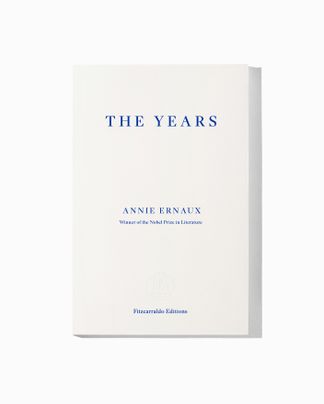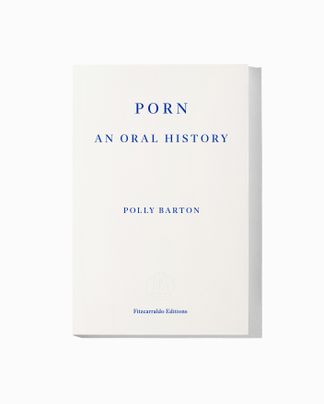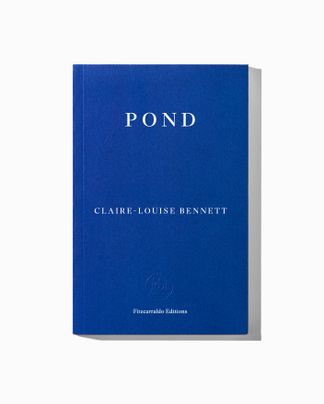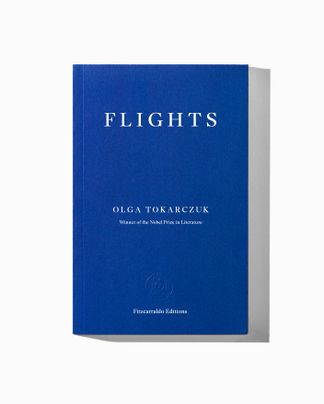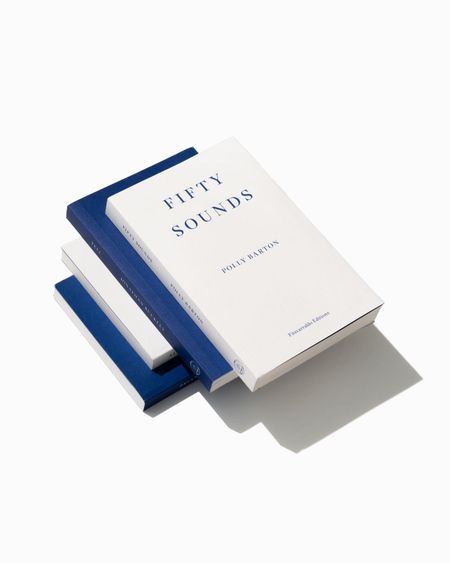Sheila Heti collected half a million words from a decade’s worth of journals, put them in a spreadsheet, and sorted them alphabetically. She spent the next ten years cutting and refining, and was left with 60,000 words of brilliance and mayhem, joy and sorrow. These are her alphabetical diaries.
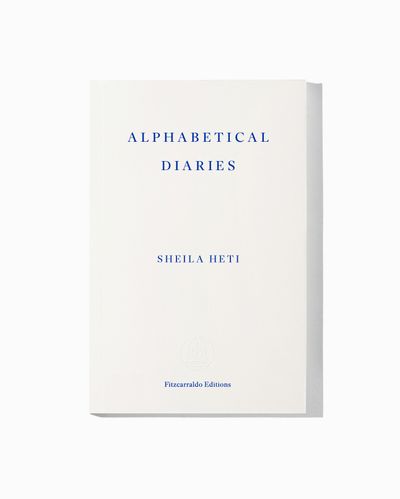
Alphabetical Diaries
French paperback with flaps, 168 pages | Audiobook read by Kate Berlant
Published 6 February 2024
Alphabetical Diaries
A
A book about how difficult it is to change, why we don’t want to, and what is going on in our brain. A book can be about more than one thing, like a kaleidoscope, it can have many things that coalesce into one thing, different strands of a story, the attempt to do several, many, more than one thing at a time, since a book is kept together by its binding. A book like a shopping mart, all the selections. A book that does only one thing, one thing at a time. A book that even the hardest of men would read. A book that is a game. A budget will help you know where to go. A bunch of us met to have dinner that night, but I left and walked off by myself, bought the silver ring, a bag of chips, then sat in the main square and bummed a cigarette off an old French man, then continued to sit there for many hours until the man with the bulgy eyes came to sit next to me and flirt. A bus came that was going to the ferry, but because I hesitated before getting on, he drove angrily away. A certain kind of bore who has said all he is saying, said it all before, and expects to hear nothing new from you on the subject. A certain lack of self-centred- ness, belief in one’s own innate genius, and faith in hard work, long hours. A child to love in that way, a man to want in that way, and all the collaborators; people with whom I can write the most heartbreaking books, and the books I write alone. A child until he is seven. A city in which people speak another language is good, because their conversations are not so distracting or irritating. A commitment to the relationship with the full understanding that the relationship will evolve and change as you two evolve and change. A curiosity about self-help. A desire to do acting. A desire to help people. A desire to uplift humanity. A different way of living now, according to my feelings and values, rather than according to stories and symbols. A drive to town for booze with Tom to get vodka for watching the movie. A fashion designer in the New York Times Magazine yesterday said, I decided to be my homosexual self. A feeling that he will completely reject me, that I don’t know what’s going on, or that he’s mad. A feeling that I could occupy myself with this feeling forever. A feminist feeling. A few minutes later he returned and untied me. A few weeks ago there was a tick in my head, a kind of check mark— it happened in a dream and upon waking—about where I am in life; I had reached adulthood and the task would be different now. A few weeks ago, sleeping with him, I realized for the first time what it meant to have sex with somebody. A flush went up high in my cheeks. A funny thing happens with regard to men when one suddenly comes into a bit of money. A glamorous life I could be leading in New York, full of parties and glamorous people, never feeling sad, alone, left out, apart. A hot man who loves me. A human knows too little to answer such questions. A human must be responded to by a human. A husband is good insurance against the crazy, against the many things of the world. A Jane Austen novel, of course, or inspired by that. A kind of tyranny to think about beauty and love all the time, when there is really nothing to think about. A lack of values, a lack of privacy, and a lack of modesty, which is making me feel kind of sick. A life in a new place for a while. A life which is beside the main current of life. A little correspondence with Lemons. A little distance between this energy and myself. A little nervous. A little too long, and it’s boring now. A look of concern, like my mother’s look of concern, is settling over my face. A loss and an unhappiness. A lot of changes are happening. A lot of fear, but of what? A lot of people in their twenties get an addiction. A lot of talk about couples and dating, but the more I think about it, the more I think I’ve been in a pretty sweet situation this past month, not dating. A man must part company with the inferior and the superficial. A man of discretion. A man to love. A man who could physically kill me in under a minute is a man who is easy to sleep beside. A man who goes out in the world and gets what he wants for himself. A man who I could have in the centre of my life, even a child, and my family could fit themselves into the healthiness and happiness of that. A man who would be mine. A manic feeling yesterday made me almost rent out that apartment in New York, but I won’t—it’s not yet time for that. A mild form of hysteria, always. A moment after seeing him, a big lurch went through my stomach, and I tried not to look at him as we talked. A new relation to life. A new relationship, born from the ashes of the old and dead one. A new tone, a new ring tone. A nice kind of animal impulse to want to sit near a tree, just because it’s a tree, and we continued to drink, from the blue goblet, the vodka and orange juice that Tom had squeezed with his bare hands. A person’s life should not be so filled up that a surprise friend can’t come in, but that doesn’t mean they have to become your new best friend. A person’s loyalty should always be to their partner, but I talked more than I wanted to or intended to about Pavel. A phone call from him yesterday—a surprise. A place I partly crave to settle into, but don’t. A playfulness, a sense of life being without consequence, that voracious sexuality that wants to eat things up, that selfishness, that kind of confidence and cockiness and ease, being on top of things, being in New York. A quiche and then an apple pie for dessert? A radical sympathy with all people based on their integrity as becomings, not beings; as people who experience the potential freedom of their own souls, so to radically know that people experience themselves from the inside, and not one person alive has ever experienced themselves from the outside. A return to writing.
(…)
‘I think Alphabetical Diaries by Sheila Heti is a future classic. A great concept executed perfectly.’
— Zadie Smith, author of The Fraud
‘It’s also thrilling, very funny, often filthy, and a surprisingly powerful weapon against loneliness, at least for this reader. How it achieves all this has to do with the sentences themselves, but even more than that with the unlikelihood of their arrangement; it’s the sentences’ crackpot proximity to one another that makes them sing (admittedly a very odd song)…. Alphabetical Diaries ends up, I think, in truly surprising territory. Heti has outsourced authorship to the alphabet; it is in charge of arranging the material; it supersedes time itself. In this way, Heti disrupts the tidying up of identity that memoirists unconsciously perform.’
— Claire Dederer, Guardian
‘In embracing life’s randomness and so thoroughly disrupting the urge to impose, through prose, order and a sense of the evolving self, [Heti] ultimately reveals just how solid our innate characteristics are and how irrepressible narrative can be.’
— Hephzibah Anderson, Observer
‘[A] pointillist description of the raging, vacillating, euphoric, despairing turbulence of Heti’s mind…. Heti has turned the pitfalls of the diary form – the relentless self-absorption, the combination of trivia and pathos – into a dazzling aesthetic virtue. Like a hologram, this book refracts an endlessly shifting light.’
— Claire Allfree, Telegraph
‘The rhythms and repetitions create a lyrical effect, elevating the often prosaic nature of diary entries…The fun comes from reading the sentences as something cumulative, an effect that shouldn’t work, yet often does.’
— Susie Mesure, Financial Times
‘I found reading Alphabetical Diaries to be a profound experience… There is something of Anaïs Nin’s journals in Alphabetical Diaries, and of Iris Murdoch’s letters, and of Edna O’Brien’s memoirs. Something locked-in and bristling. Heti is wrestling openly with the things that matter.’
— Dwight Garner, New York Times
‘Sheila Heti keeps transforming my idea of writing. Her Alphabetical Diaries isn’t just dirty and funny and poignant; it reproposes everything you thought about a self and the way time passes.’
— Adam Thirlwell, author of The Future Future
‘Alphabetical Diaries is a testament to Heti’s artistic power. She gently leads the reader into new dimensions of language previously undiscovered. Beautiful and uncompromising.’
— Marlowe Granados, author of Happy Hour
‘A book that is in many ways is an ode to the sentence; from the muscle of single line to the power that comes with accrual. An immersive and hugely entertaining read.’
— Sinéad Gleeson author of Constellations
‘I am drawn to Sheila Heti’s writing like a moth to a flame and Alphabetical Diaries is amongst the most affecting, exquisite books I’ve ever encountered. It is, simply put, utterly and startlingly good. Heti writes so creaturely, so bodily, that it feels like a whole new genre is being formed as we read.’
— Kerri ní Dochartaigh author of Cacophony of Bone
‘I’ll read anything Sheila Heti writes.’
— Lauren Oyler, author of Fake Accounts
‘I tend to succumb to the soft imperative of Heti’s project as an artist: to be as open-hearted of a reader as she is as a writer, to go with her gratefully into this meeting of childlike wonder, existential dread, and that near-constant horniness. In fact, it may be this hunger that holds the whole book together, those basic cravings that we all experience in one way or another, those desires so many of us tally in private, thinking they make us particular when they actually make us human.’
— Catherine Lacey, Bookforum
‘Heti writes so creaturely, so bodily, that it feels a whole new genre is being formed as we read. Here she takes the ideas we had of her and her work and shakes them like the little glass snow globe that they are, leaving the letters as our only lantern here – her writing shining clearer for it all, somehow.’
— Kerri ní Dochartaigh, Irish Times
‘The resulting book is exhilarating: both intimate and withholding, repetitive and generative, undeniably self-centred and yet moving beyond the self.’
— Anna Leszkiewicz, New Statesman
‘Whether it should be considered a memoir or something else entirely, Alphabetical Diaries looks at how we see ourselves and how we’d like to be seen.’
— Time
‘The way [Heti] has shuffled the deck of her life invites the reader to join her in both the hungry blindness of the present and the elegant luxury of hindsight – to make meaning out of the peg in the table, the phone call from her mother, even the green skirt.’
— Julia Berick, Los Angeles Review of Books
‘The alphabetized sentences give the book momentum and entertaining accidents of language create intriguing micro-stories on every page…. [R]eaders who enjoy Heti’s fiction should be enthralled. The picture of a committed, inventive, sincere writer and the times she lives in, which emerges from this experiment, is fascinating.’
— Max Liu, i News
‘[O]ne of the freshest, funniest and most ingenious humans writing today … one of our best living authors.’
— Becca Rothfeld, Washington Post
‘Heti’s books aim to be vessels for the transformation of reader and writer. She has spoken of writing a book that would be like a Richard Serra sculpture, which a reader might walk through in the same way that the writer has undergone its creation, not knowing exactly where it is heading or how it will end…. Though the formal challenges vary, Heti is always pressing at the membrane between life and art, beauty and ugliness’
— Parul Sehgal, New Yorker
‘Like Iris Murdoch’s novels, Heti’s are philosophically intense, although Heti’s work is pared down where Murdoch’s was Rabelaisian.’
— Dwight Garner, New York Times
‘Heti’s cerebral, romantic sensibility rises to the surface; a page and a half of maybes; a page of perhapses; lists of I wants, I wases, I wents and I wills…. [She] paints a life both touched by human connection yet with a loneliness at its center. Alphabetical Diaries is a feat of creativity, demonstrating Heti’s considered yet candid mastery of language and storytelling.’
— Paula Lacey, The Skinny
‘By fragmenting and then formulaically rearranging these personal records, Heti has reinvigorated them as more than a journal, brought them to life as a fascinating book which highlights the consistency and inconsistencies of us all, how our minds flit from subject to subject to elsewhere. It is a warm-hearted, individual, exploration of what it is to be alive, what it is to be human.’
— Rupert Loydall, Tears in the Fence
‘Sheila Heti is a master of form, constantly expanding the bounds of fiction while expertly defamiliarizing the experience of being human, ultimately drawing you closer to it.’
— Nylon
‘A profoundly unusual, experimental, yet engrossing work of not-quite-memoir…. For those who can understand her ambition beyond the form, settling into the rhythm of Heti’s poetic observations gives way to a rich narrative reward.’
— Lauren Puckett-Pope, Elle
‘[It] is a compelling work that feels both formally brand new, and therefore disorientating, and uncannily familiar in its evocations of life…. As well as the energy and beauty of individual sentences, their juxtapositions are ingenious, truthful and often very funny…. Reading Alphabetical Diaries is like an intimate encounter with the soul of an insatiably curious, brilliant, contradictory, effervescent writer intensely engaged with words, ideas, art and life…. It is fascinating what emerges from this homage to the potency and capaciousness of the sentence. Alphabetical Diaries is a work of great humour, brilliance and beauty. I was entranced.’
— Jane Gleeson-White, Sydney Morning Herald
Praise for Pure Colour
‘Pure Colour is the apocalypse written as trance, a sleep-walker’s song about the end of all things … an original, a book that says something new for our difficult times.’
— Anne Enright, Guardian
Praise for Motherhood
‘Sheila Heti has broken new ground.’
— Rachel Cusk, author of Second Place
Praise for How Should a Person Be?
‘Exhilarating … it made me want to write.’
— Sally Rooney, author of Beautiful World, Where Are You?
Sheila Heti is the author of eleven books, including the novels Pure Colour, Motherhood, and How Should a Person Be?, which New York magazine deemed one of the New Classics of the twenty-first century. Her books have been translated into twenty-four languages. She lives in Toronto, Canada. Alphabetical Diaries is her first book with Fitzcarraldo Editions.

